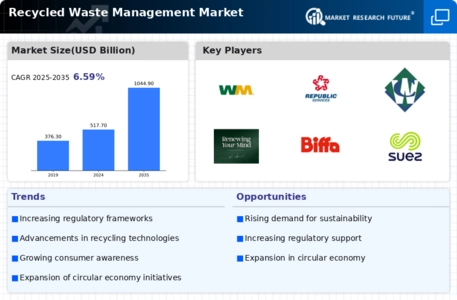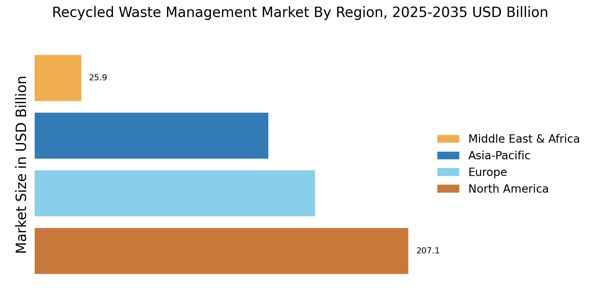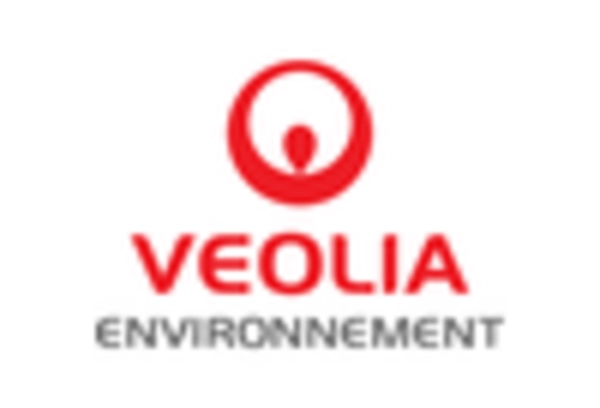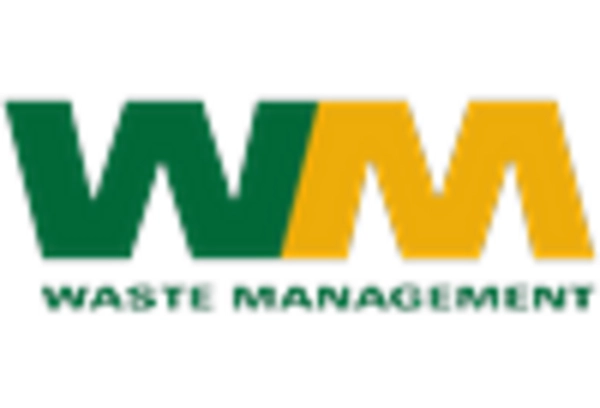Economic Benefits of Recycling
The economic benefits associated with recycling are becoming increasingly apparent, thereby influencing the Recycled Waste Management Market. Recycling not only conserves natural resources but also generates significant economic value. Studies suggest that for every job in the recycling industry, approximately 1.17 jobs are created in the manufacturing sector. This job creation is vital for local economies and contributes to overall economic growth. Additionally, recycling reduces the costs associated with waste disposal and raw material procurement. As businesses and municipalities recognize these economic advantages, there is a growing inclination to invest in recycling programs and infrastructure. This trend is expected to further stimulate the growth of the recycled waste management market.
Growing Environmental Awareness
There is a notable increase in environmental awareness among consumers and businesses, which is significantly influencing the Recycled Waste Management Market. As individuals become more conscious of their ecological footprint, the demand for recycled products is rising. Reports indicate that approximately 70% of consumers are willing to pay a premium for products made from recycled materials. This shift in consumer behavior is prompting companies to adopt sustainable practices and invest in recycling initiatives. Additionally, businesses are recognizing the potential for brand differentiation through sustainability, leading to increased competition in the market. This heightened awareness is expected to drive growth in the recycled waste management sector.
Government Policies and Incentives
Government policies and incentives play a crucial role in shaping the Recycled Waste Management Market. Many governments are implementing regulations that mandate recycling and waste reduction, thereby creating a favorable environment for recycling businesses. For example, extended producer responsibility (EPR) laws require manufacturers to take responsibility for the entire lifecycle of their products, including end-of-life disposal. Such policies not only encourage recycling but also stimulate innovation in waste management solutions. Furthermore, financial incentives, such as tax breaks and grants for recycling facilities, are likely to enhance investment in the sector. These supportive measures are expected to bolster the growth of the recycled waste management market.
Corporate Sustainability Initiatives
The rise of corporate sustainability initiatives is significantly impacting the Recycled Waste Management Market. Companies are increasingly recognizing the importance of integrating sustainability into their business models. This trend is driven by both consumer expectations and regulatory pressures. Many corporations are setting ambitious recycling targets and committing to using recycled materials in their products. For instance, major brands are pledging to achieve 100% recyclable packaging by 2025. Such commitments not only enhance brand reputation but also contribute to the overall growth of the recycled waste management sector. As more companies adopt sustainable practices, the demand for effective recycling solutions is likely to increase.
Technological Innovations in Recycling Processes
The Recycled Waste Management Market is experiencing a surge in technological innovations that enhance recycling processes. Advanced sorting technologies, such as AI-driven systems, are improving the efficiency of material recovery facilities. These innovations not only streamline operations but also increase the quality of recycled materials. For instance, the implementation of automated sorting can lead to a 20% increase in recovery rates. Furthermore, the development of new recycling methods, such as chemical recycling, allows for the processing of materials that were previously deemed non-recyclable. This evolution in technology is likely to attract investments, as companies seek to optimize their recycling capabilities and reduce operational costs.

















